(完整版)非谓语动词的中译英练习200句
非谓语翻译练习
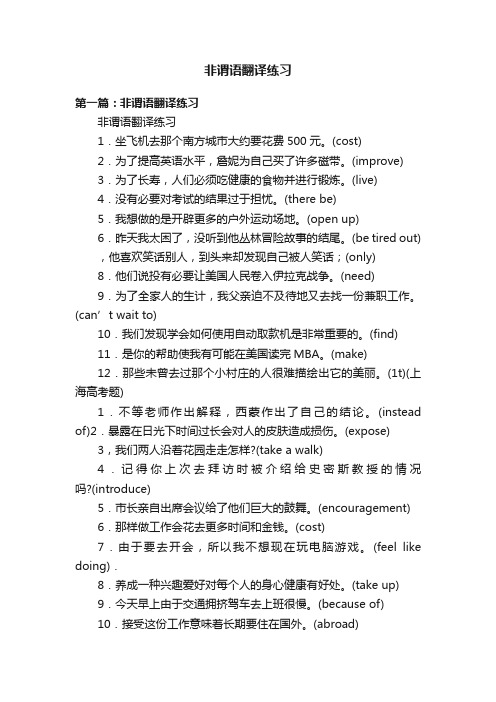
非谓语翻译练习第一篇:非谓语翻译练习非谓语翻译练习1.坐飞机去那个南方城市大约要花费500元。
(cost)2.为了提高英语水平,詹妮为自己买了许多磁带。
(improve)3.为了长寿,人们必须吃健康的食物并进行锻炼。
(live)4.没有必要对考试的结果过于担忧。
(there be)5.我想做的是开辟更多的户外运动场地。
(open up)6.昨天我太困了,没听到他丛林冒险故事的结尾。
(be tired out) ,他喜欢笑话别人,到头来却发现自己被人笑话;(only)8.他们说投有必要让美国人民卷入伊拉克战争。
(need)9.为了全家人的生计,我父亲迫不及待地又去找一份兼职工作。
(can’t wait to)10.我们发现学会如何使用自动取款机是非常重要的。
(find)11.是你的帮助使我有可能在美国读完MBA。
(make)12.那些未曾去过那个小村庄的人很难描绘出它的美丽。
(1t)(上海高考题)1.不等老师作出解释,西蒙作出了自己的结论。
(instead of)2.暴露在日光下时间过长会对人的皮肤造成损伤。
(expose) 3,我们两人沿着花园走走怎样?(take a walk)4.记得你上次去拜访时被介绍给史密斯教授的情况吗?(introduce)5.市长亲自出席会议给了他们巨大的鼓舞。
(encouragement) 6.那样做工作会花去更多时间和金钱。
(cost)7.由于要去开会,所以我不想现在玩电脑游戏。
(feel like doing).8.养成一种兴趣爱好对每个人的身心健康有好处。
(take up)9.今天早上由于交通拥挤驾车去上班很慢。
(because of)10.接受这份工作意味着长期要住在国外。
(abroad)参考答案1.Instead of waiting for the teacher to explain, Simon formed his own conclusion.2.Being exposed to sunlight for too much time will do harm to one's skin.What about two of us taking a walk down the garden?4.Do you remember being introduced to Professor Smith during your last visit?5.The mayor' s attending the meeting himself gave them a great deal of /great encouragement.6.Doing the work in that way will cost much more time and energy.7.Because I have to attend a meeting, I don't feel like playing with computer games now.8.Taking up a hobby is good for people's physical and mental health.9.Driving to the office was very slow this morning because of the traffic jam.10.Accepting the job means living abroad for a long time.1.It costs about five hundred yaun to fly to the southern city.2.In order to improve English, Jenny bought a lot of tapes for herself.3.To live longer, one must eat healthy food and take physical exercise/do sports.4.There's no need to become too anxious about the result of the exam.5.What I want to do is to open up more space for outdoor sports.6.Yesterday I was too tired out to hear the end of his story about his adventure in the forest.7.He enjoyed laughing at others, only to find himself laughed at.8.They say there's no need for American people to be involved in the Iraq War.9.To support the whole family, my father couldn't wait to find a part-time job.10.We find it very important to learn how to use the auto banking machines.11.It was your help that made it possible for me to complete the MBA course in the USA smoothly.12.It's very hard for those who haven't been to the small village to describe its beauty.第二篇:非谓语动词翻译练习用非谓语动词翻译下列句子(Spring编辑)(A)1、我钱不够,不能买这房子。
非谓语动词的中译英试200句

非谓语动词的中译英试200句————————————————————————————————作者:————————————————————————————————日期:2译英练习200句1.中国是一个发展中国家,属于第三世界(the Third World)China is a developing country, belonging to the Third World.2.没有士兵在操练。
(定语)There are no soldiers drilling.3.学走路的孩子常跌脚(定语)A child learning to walk often falls.4.在这里干活的人都来自农村。
(定语)The men working here are all from the countryside.5.那天向我们讲话的那个人到日本去了。
(定语)The man speaking to us has gone to Japan.6.有许多学生在车站等着欢迎外籍教师。
(定语)There are a lot of students waiting to welcome the foreign teachers.7.他在大学里学习的那个妹妹是个党员(定语)。
His sister studying at college is a Party member.8.他妹妹在大学里学习,她是个党员。
(和上句比较)His sister, studying at college, is a Party member.9.我昨天在河边遇到了麦克,他在钓鱼。
(定语)Yesterday at the riverside I met Mike , fishing.10 .史密斯先生昨天作的报告非常有趣(定语)The lecture given by Mr. Smith was very interesting.10.这些实习生(trainees)制造的机器运转良好。
非谓语动词翻译练习

1.那时她看到一位女士正从火车站跑出来. 那时她看到一位女士正从火车站跑出来. 那时她看到一位女士正从火车站跑出来 At that time she saw a lady running out of the railway station. 2.他站在那里的时候注意到两个人走进了酒 他站在那里的时候注意到两个人走进了酒 吧. When he stood there, he noticed two men walk into the pub. 3.我们急忙赶到现场,发现这座建筑完全毁 我们急忙赶到现场, 我们急忙赶到现场 掉了. 掉了. We hurried to the scene and found the building totally destroyed.
2.
see watch hear + n. + notice
doeard her sing an English song just now. I heard her singing an English song when I passed by her room yesterday. I heard the English song sung by a little girl the other day.
4.人们常早起去海边看太阳从海上升起 人们常早起去海边看太阳从海上升起 People often get up early to watch the sun rise from the sea at the seaside. 5.有人听到他常常抱怨公路上的噪音. 有人听到他常常抱怨公路上的噪音. 有人听到他常常抱怨公路上的噪音 He is often heard to complain about the noise from the road.
非谓语动词 200题加详细解释答案
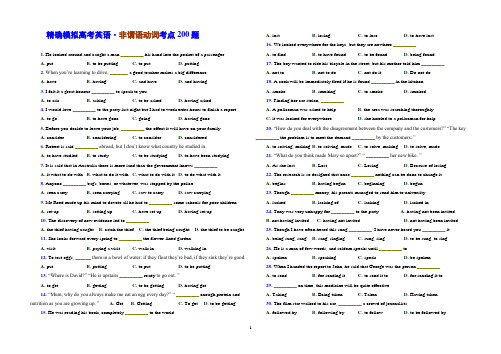
精确模拟高考英语·非谓语动词考点200题1. He looked around and caught a man _________ his hand into the pocket of a passenger.A. putB. to be puttingC. to putD. putting2.When you’re learning to drive, _______ a good teacher makes a big difference.A. haveB. havingC. and haveD. and having3. I felt it a great honour _________ to speak to you.A. to askB. askingC. to be askedD. having asked4. I would love _________ to the party last night but I had to work extra hours to finish a report.A. to goB. to have goneC. goingD. having gone5. Before you decide to leave your job, _________ the effect it will have on your family.A. considerB. consideringC. to considerD. considered6. Robert is said _________abroad, but I don’t know what country he studied in.A. to have studiedB. to studyC. to be studyingD. to have been studying7. It is said that in Australia there is more land than the government knows _________.A. it what to do withB. what to do it withC. what to do with itD. to do what with it8. Anyone _________ bags, boxes, or whatever, was stopped by the police.A. seen carryB. seen carryingC. saw to carryD. saw carrying9. Mr Reed made up his mind to devote all he had to _________ some schools for poor children.A. set upB. setting upC. have set upD. having set up10. The discovery of new evidence led to _________.A. the thief having caughtB. catch the thiefC. the thief being caughtD. the thief to be caught11. She looks forward every spring to _________ the flower-lined garden.A. visitB. paying a visitC. walk inD. walking in12. To test eggs, ______them in a bowl of water: if they float they’re bad, if they sink they’re good.A. putB. puttingC. to putD. to be putting13.“Where is David?” “He is upstairs _________ ready to go out. ”A. to getB. gettingC. to be gettingD. having got14.“Mum, why do you always make me eat an egg every day?” “ _________ enough protein and nutrition as you are growing up. ” A. Get B. Getting C. To get D. to be getting15. He was reading his book, completely _________ to the world.A. lostB. losingC. to loseD. to have lost16. We looked everywhere for the keys, but they are nowhere _________.A. to findB. to have foundC. to be foundD. being found17. The boy wanted to ride his bicycle in the street, but his mother told him _________.A. not toB. not to doC. not do itD. Do not do18. A cook will be immediately fired if he is found _________ in the kitchen.A. smokeB. smokingC. to smokeD. smoked19. Finding her car stolen, _________.A. A policeman was asked to helpB. the area was searching thoroughlyC. it was looked for everywhereD. she hurried to a policeman for help20.“How do you deal with the disagreement between the company and the customers?” “The key _________ the problem is to meet the demand _________by the customers. ”A. to solving, makingB. to solving, madeC. to solve, makingD. to solve, made21.“What do you think made Mary so upset?” “ _________her new bike. ”A. As she lostB. LostC. LosingD. Because of losing22. The research is so designed that once _________ nothing can be done to change it.A. beginsB. having begunC. beginningD. begun23. Though _________ money, his parents managed to send him to university.A. lackedB. lacking ofC. lackingD. lacked in24. Tony was very unhappy for _________ to the party. A. having not been invitedB. not having invitedC. having not invitedD. not having been invited25. Though I have often heard this song _________. I have never heard you _________ it.A. being sung, sangB. sang, singingC. sung, singD. to be sung, to sing26. He is a man of few words, and seldom speaks until _________ to.A. spokenB. speakingC. speakD. be spoken28. When I handed the report to John, he said that George was the person _________.A. to sendB. for sending itC. to send it toD. for sending it to29._________ on time, this medicine will be quite effective.A. TakingB. Being takenC. TakenD. Having taken30. The film star walked to his car, _________ a crowd of journalists.A. followed byB. following byC. to followD. to be followed by31. after describing the planned improvements, she went on _________ how much they would cost.A. to explainB. explainingC. to be explainingD. having explained32. Please excuse me _________ your letter by mistake.A. to openB. to have openedC. for openingD. in opening33. Please remember _________the plants while I’m away.A. wateringB. to be wateringC. to waterD. being watering34. Certainly I posted your letter — I remember _________ it.A. postingB. to postC. to be postingD. have posted35. Stop _________ me to hurry up. I can only go so fast.A. to tellB. tellingC. to have toldD. having told36. Remember _________ off the light when _________ to bed.A. turning, goingB. to turn, to goC. turning, to goD. to turn, going37._________time, he’ll make a first-class tennis player.A. Having givenB. To giveC. GivingD. Given38._________ in 1636, Harvard is one of the most famous universities in the United States.A. being foundedB. It was foundedC. FoundedD. Founding39. The lady said she would buy a gift for her daughter with the _________.A. 20 dollars remainedB. 20 dollars to remainC. remained 20 dollarsD. remaining 20 dollars40. The picture _________ on the wall is painted by my nephew.A. having hungB. hangingC. hangsD. being hung41. With a lot of difficult problems _________, the newly-elected president is having a hard time.A. settledB. settingC. to settleD. being settled42. Having a trip abroad is certainly good for the old couple, but it remains _________ whether they will enjoy it. A. to see B. to be seen C. seeing D. seen43. Tony was very unhappy for _________ to the party. A. having not been invitedB. not having invitedC. having not inviteD. not having been invited44.“Good morning. can I help you?” “I’d like to have this package _________. ”A. be weighedB. to be weighedC. to weighD. weighed45. What have we said _________ her so happy?A. makesB. to makeC. madeD. has made46. What worried the child most was _________ to visit his mother in the hospital.A. his not allowingB. his not being allowed C his being not allowed D. having not being allowed47.“Which sweater is yours?” “The one _________ No. 9. ”A. that markedB. was marked withC. which markedD. marked with48.If the car won’t start, _________ it.A. try pushB. try pushingC. to try pushingD. to try to push49. They stayed up until midnight _________ the old year out and the new year in.A. and sawB. to seeC. seeingD. for seeing50. One learns a language by making mistakes and _________ them.A. correctB. correctingC. correctsD. to correct51. Tony was very unhappy for _________ to the party. A. having not been invitedB. not having invitedC. having not invitedD. not having been invited52.—Let me tell you something about the journalists.—Don’t you remember _________ me the story yesterday?A. toldB. tellingC. to tellD. to have told53.She can’t help _________the house because she’s busy making a cake.A to clean B. C。
非谓语动词翻译练习(有答案)
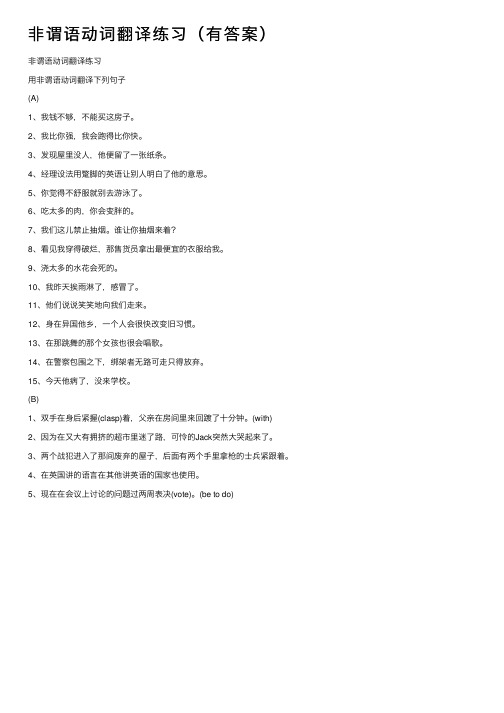
⾮谓语动词翻译练习(有答案)
⾮谓语动词翻译练习
⽤⾮谓语动词翻译下列句⼦
(A)
1、我钱不够,不能买这房⼦。
2、我⽐你强,我会跑得⽐你快。
3、发现屋⾥没⼈,他便留了⼀张纸条。
4、经理设法⽤蹩脚的英语让别⼈明⽩了他的意思。
5、你觉得不舒服就别去游泳了。
6、吃太多的⾁,你会变胖的。
7、我们这⼉禁⽌抽烟。
谁让你抽烟来着?
8、看见我穿得破烂,那售货员拿出最便宜的⾐服给我。
9、浇太多的⽔花会死的。
10、我昨天挨⾬淋了,感冒了。
11、他们说说笑笑地向我们⾛来。
12、⾝在异国他乡,⼀个⼈会很快改变旧习惯。
13、在那跳舞的那个⼥孩也很会唱歌。
14、在警察包围之下,绑架者⽆路可⾛只得放弃。
15、今天他病了,没来学校。
(B)
1、双⼿在⾝后紧握(clasp)着,⽗亲在房间⾥来回踱了⼗分钟。
(with)
2、因为在⼜⼤有拥挤的超市⾥迷了路,可怜的Jack突然⼤哭起来了。
3、两个战犯进⼊了那间废弃的屋⼦,后⾯有两个⼿⾥拿枪的⼠兵紧跟着。
4、在英国讲的语⾔在其他讲英语的国家也使⽤。
5、现在在会议上讨论的问题过两周表决(vote)。
(be to do)。
英语非谓语动词的汉译英
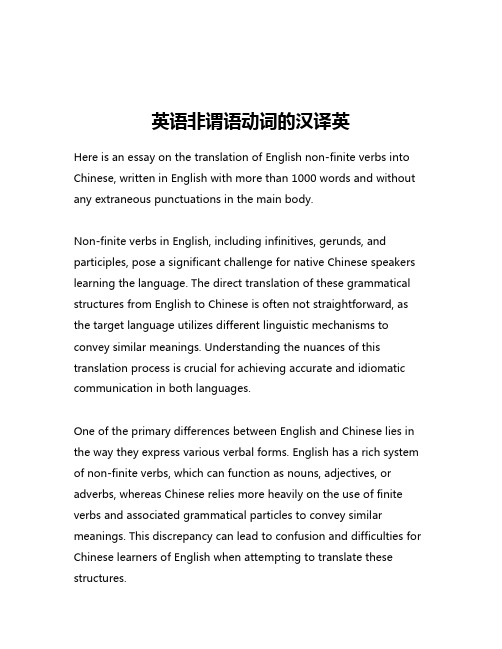
英语非谓语动词的汉译英Here is an essay on the translation of English non-finite verbs into Chinese, written in English with more than 1000 words and without any extraneous punctuations in the main body.Non-finite verbs in English, including infinitives, gerunds, and participles, pose a significant challenge for native Chinese speakers learning the language. The direct translation of these grammatical structures from English to Chinese is often not straightforward, as the target language utilizes different linguistic mechanisms to convey similar meanings. Understanding the nuances of this translation process is crucial for achieving accurate and idiomatic communication in both languages.One of the primary differences between English and Chinese lies in the way they express various verbal forms. English has a rich system of non-finite verbs, which can function as nouns, adjectives, or adverbs, whereas Chinese relies more heavily on the use of finite verbs and associated grammatical particles to convey similar meanings. This discrepancy can lead to confusion and difficulties for Chinese learners of English when attempting to translate these structures.The English infinitive, for instance, is often rendered in Chinese through the use of the modal verb 要(yào) or the preposition 去(qù). For example, the sentence "I want to go to the park" can be translated as "我要去公园" (Wǒ yào qù gōngyuán), where the infinitive "to go" is expressed through the modal verb 要(yào). Similarly, the phrase "I like to read books" can be rendered as "我喜欢去读书" (Wǒ xǐhuān qù dúshū), where the infinitive "to read" is conveyed using the preposition 去(qù).Gerunds, on the other hand, can be a more challenging aspect of translation, as Chinese does not have a direct equivalent grammatical structure. In such cases, Chinese often relies on nominalizing the verb through the use of the particle 的 (de) or the noun 事(shì). For instance, the English sentence "I enjoy swimming" can be translated as "我喜欢游泳的" (Wǒ xǐhuān yóuyǒng de) or "我喜欢游泳这件事" (Wǒ xǐhuān yóuyǒng zhè jiàn shì), where the gerund "swimming" is rendered as a nominalized verb.Participles, which can function as adjectives in English, also require careful consideration when translating into Chinese. In many cases, Chinese utilizes a relative clause structure or a verb-object construction to convey the meaning of a participle. For example, the sentence "The sleeping child is adorable" can be translated as "正在睡觉的孩子很可爱" (Zhèngzài shuìjiào de háizi hěn kěài), where thepresent participle "sleeping" is expressed through the relative clause "正在睡觉的" (zhèngzài shuìjiào de).Additionally, the translation of non-finite verbs can be further complicated by the context-dependent nature of their usage in both languages. Certain idiomatic expressions or colloquial phrases may require more nuanced approaches to ensure accurate and natural-sounding translations. For instance, the English phrase "I can't help but laugh" may be rendered in Chinese as "我忍不住笑了" (Wǒ rěn bù zhù xiào le), where the infinitive "to laugh" is expressed through the verb-object construction "忍不住笑" (rěn bù zhù xiào).Mastering the translation of non-finite verbs between English and Chinese is a crucial aspect of achieving proficiency in both languages. It requires a deep understanding of the grammatical structures, idiomatic expressions, and cultural nuances that shape the way these verbal forms are used and conveyed. By developing a comprehensive knowledge of these translation principles, learners can enhance their ability to communicate effectively and accurately in cross-linguistic contexts, ultimately facilitating meaningful and successful intercultural exchanges.。
非谓语动词翻译练习
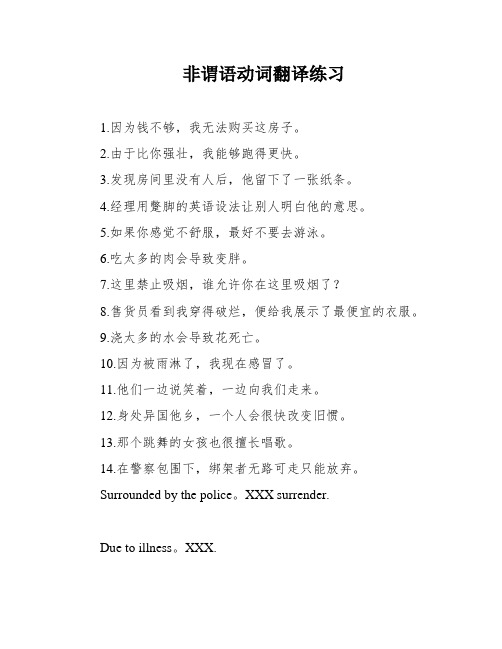
非谓语动词翻译练习1.因为钱不够,我无法购买这房子。
2.由于比你强壮,我能够跑得更快。
3.发现房间里没有人后,他留下了一张纸条。
4.经理用蹩脚的英语设法让别人明白他的意思。
5.如果你感觉不舒服,最好不要去游泳。
6.吃太多的肉会导致变胖。
7.这里禁止吸烟,谁允许你在这里吸烟了?8.售货员看到我穿得破烂,便给我展示了最便宜的衣服。
9.浇太多的水会导致花死亡。
10.因为被雨淋了,我现在感冒了。
11.他们一边说笑着,一边向我们走来。
12.身处异国他乡,一个人会很快改变旧惯。
13.那个跳舞的女孩也很擅长唱歌。
14.在警察包围下,绑架者无路可走只能放弃。
Surrounded by the police。
XXX surrender.Due to illness。
XXX.1.With his hands clasped behind him。
XXX in the room for ten minutes.2.Lost in the big and crowded supermarket。
poor Jack XXX.3.The two war XXX。
XXX.4.XXX is also used in other English-speaking countries.5.The issue currently being discussed at the meeting will be voted on in two weeks' time.6.It is often quoted as a warning for children not to leave their XXX to the cold wind.7.The old farmer liked to walk around in the field in his free time and did not like to stay at home.XXX during his free time。
非谓语动词的中译英练习200句
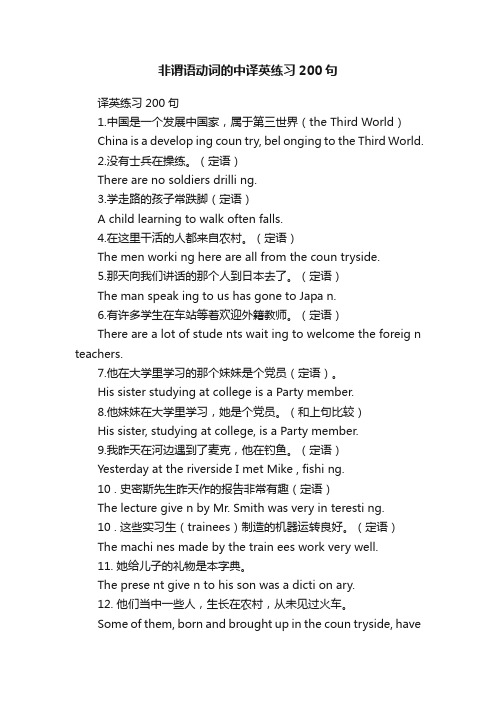
非谓语动词的中译英练习200句译英练习200句1.中国是一个发展中国家,属于第三世界(the Third World)China is a develop ing coun try, bel onging to the Third World.2.没有士兵在操练。
(定语)There are no soldiers drilli ng.3.学走路的孩子常跌脚(定语)A child learning to walk often falls.4.在这里干活的人都来自农村。
(定语)The men worki ng here are all from the coun tryside.5.那天向我们讲话的那个人到日本去了。
(定语)The man speak ing to us has gone to Japa n.6.有许多学生在车站等着欢迎外籍教师。
(定语)There are a lot of stude nts wait ing to welcome the foreig n teachers.7.他在大学里学习的那个妹妹是个党员(定语)。
His sister studying at college is a Party member.8.他妹妹在大学里学习,她是个党员。
(和上句比较)His sister, studying at college, is a Party member.9.我昨天在河边遇到了麦克,他在钓鱼。
(定语)Yesterday at the riverside I met Mike , fishi ng.10 . 史密斯先生昨天作的报告非常有趣(定语)The lecture give n by Mr. Smith was very in teresti ng.10 . 这些实习生(trainees)制造的机器运转良好。
(定语)The machi nes made by the train ees work very well.11. 她给儿子的礼物是本字典。
- 1、下载文档前请自行甄别文档内容的完整性,平台不提供额外的编辑、内容补充、找答案等附加服务。
- 2、"仅部分预览"的文档,不可在线预览部分如存在完整性等问题,可反馈申请退款(可完整预览的文档不适用该条件!)。
- 3、如文档侵犯您的权益,请联系客服反馈,我们会尽快为您处理(人工客服工作时间:9:00-18:30)。
译英练习200句1.中国是一个发展中国家,属于第三世界(the Third World)China is a developing country, belonging to the Third World.2.没有士兵在操练。
(定语)There are no soldiers drilling.3.学走路的孩子常跌脚(定语)A child learning to walk often falls.4.在这里干活的人都来自农村。
(定语)The men working here are all from the countryside.5.那天向我们讲话的那个人到日本去了。
(定语)The man speaking to us has gone to Japan.6.有许多学生在车站等着欢迎外籍教师。
(定语)There are a lot of students waiting to welcome the foreign teachers.7.他在大学里学习的那个妹妹是个党员(定语)。
His sister studying at college is a Party member.8.他妹妹在大学里学习,她是个党员。
(和上句比较)His sister, studying at college, is a Party member.9.我昨天在河边遇到了麦克,他在钓鱼。
(定语)Yesterday at the riverside I met Mike , fishing.10 .史密斯先生昨天作的报告非常有趣(定语)The lecture given by Mr. Smith was very interesting.10.这些实习生(trainees)制造的机器运转良好。
(定语)The machines made by the trainees work very well.11.她给儿子的礼物是本字典。
The present given to his son was a dictionary.12.他们当中一些人,生长在农村,从未见过火车。
Some of them, born and brought up in the countryside, have never seen a train.13.正在修建的这座房子将作我们的餐厅。
The building being built will be served as our dining- hall.14.我们在规定的时间和地点见到了他。
We met him at the time and place given.15.当时所用的仪器(instrument)是新式的。
The instrument used at that time was new.16.这些是旧汽车。
These are used cars.17.我昨天收到了一封用英文写的信。
Yesterday I received a letter written in English.18.在那棵大树底下朗读的那个女孩是谁?Who is the girl reading aloud under the big tree?19.你曾亲眼见过那幢建于十八世纪二十年代的楼么?Have you seen the building built in the 1970s?20.欢迎那些对此讲座感兴趣的人准时参加。
Those interested in the lecture are welcome to attend it in time.21.这些是历史遗留(leave over)下来的问题.These are problems left over in history.22.还有三个问题有待解决。
(以上各句用分词作定语表达) There are 3 problems remaining to be solved. There are 3 problems to besolved23.听到这个消息他们高兴(或激动)得跳了起来.Hearing the news, they jumped with joy(excitement).24.由于不知道地址,我们没法和他取得联系。
Not knowing his address, we have no way to get in touch with him. 25.他们给我寄来一封信,希望得到我的支持。
They sent a letter to me , hoping to get my support.26.他在站在那里等公共汽车。
He stood there waiting for the bus.27.这些学生说说笑笑的走进教室。
The students walked into the classroom, talking and laughing.28.这位外国人站在那里看起来很焦急,显然是迷路了。
The foreigner stood there, looking very worried and obviously getting lost.29.她坐在那里想事哩。
She sat there, thinking.30.我刚才在这里遇到一个女孩,看起来像是护士。
Just now I met a girl here, looking like a nurse.31.我和他共事多年,对该人很是了解。
Having been working with him for many years, I knows him very well. 32.回到家里他开始做准备。
Arriving home, he began to prepare.33.她来到我身边,说“很高兴又遇到你”。
She came up to me, saying “ Glad to meet you.”34.罗密欧(Romeo)相信朱丽叶(Juliet)已死,就决定自杀。
Believing that Juliet had died ,Romeo decided to kill himself.35.知道自己的钱不够,又不想向自己的父亲借,他决定把表当(pawn)了.Knowing that he hadn’t enough money and not wanting to borrow from his father,he decided to pawn his watch.36.既不懂当地的语言,在这国家又没有朋友,她觉得要想找到工作是不可能的。
Not understanding the locallanguage and having no friend in the country, he found it impossible to find a job.37.从窗口望去,我看见有几只小鸟在树上歌唱。
Looking out of the window, I saw a few birds singing in the tree.38.感到不舒服,我就找医生诊病。
Not feeling comfortable, I went to see a doctor.39.这小孩跌了一脚,头在门上碰破了。
(strike one’s head against).The child fell over, striking his head against the wall.40.把这些数字加起来,我们就会得到正确的答案.Adding up the figures, we’ll find the correct answers.41.我们跟着老师进了教室.We entered the classroom, following our teacher.42.我们当时坐在窗户边谈论着昨天发生的事。
We sat by the window, talking about what had happened the day before. 43.这个保安员认为杰克逊先生是个贼,转过身来抓住了他。
Thinking that Mr. Jackson was a thief, the guard turned around and caught him.44.Helen那天向我借了一本字典,并说很快会还给我。
Helen borrowed a dictionary from me, saying that she would return it to me soon.45.我因病待在家里。
Being ill, I had to stay at home.46.登到了山顶,我们看到了一片壮丽的景色。
Climbing to the top of the mountain, I saw a beautiful scene.47.他出去后随手把门关上.He went out, shutting the door from behind.48.那是个愤怒的人指着布告说,”难道你们不会看么?”“ Can’t you read?” the man said, angrily pointing to the notice.49.住在偏僻的乡下,他们对外界发生的事知之甚少.Living in the lonely countryside, they know little about the outside world. 50.铃声响了,宣布下课了。
The bell rang, announcing the end of class.51.他气喘吁吁地(breathe heavily)地跑到她跟前。
He ran up to her, breathing heavily.52.他躺在那里撒谎说前天鸡子下的蛋已经放在篮子里了。
He lay there lying that the eggs laid by the hens the day before yesterday had been laid in the basket.53.他靠墙站着。
He stood there leaning against the wall.54.妈妈给我量了体温发现我正发烧。
Having taken my temperature, my mother found I was having a high fever. 55.因为生病了,明天我不能去上学。
Being ill,I can’t go to school tomorrow.56.干完活后,我们休息了一下。
Having finished the work, I had a rest. With the work done, I had a rest. 57.我们被领着看了实验室,又被带着去看了图书馆。
